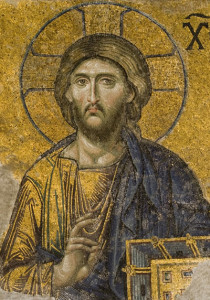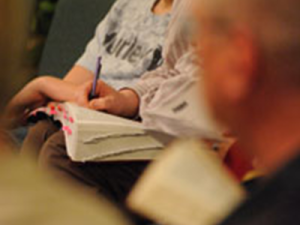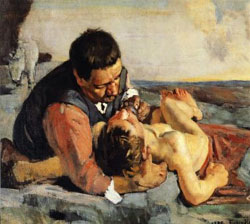Credo in Unum Deum…
 Where to begin? There’s much to say, but let’s start simply, and profoundly, with Jesus. We love Jesus.
Where to begin? There’s much to say, but let’s start simply, and profoundly, with Jesus. We love Jesus.
God’s story, from beginning to end, is found in Jesus Christ. We are evangelical and confess that Jesus is Lord. And we are also rooted in orthodoxy, confessing the historic Christian faith recorded in Holy Scripture, handed down in the Tradition of the Apostles, defended by the Church Fathers and the ecumenical creeds, and affirmed by Christians everywhere and at all times. We believe the biblical narrative is the divinely-inspired record of the Triune God’s saving acts and deeds throughout history culminating in the person and work of Jesus Christ, to Whom all Scripture points.
Why an emphasis on God’s story? Because His story – Creation, Incarnation, and Re-creation – is pervasive and powerful, and it alone provides redemptive meaning and hope to a lost world. And so we embrace and affirm The Call to an Ancient-Evangelical Future in its desire “for public worship that sings, preaches and enacts God’s story” and “for a renewed consideration of how God ministers to us in baptism, Eucharist, confession, the laying on of hands, marriage, healing and through the charisms of the Spirit, for these actions shape our lives and signify the meaning of the world. Thus, we call Evangelicals to turn away from forms of worship that focus on God as a mere object of the intellect, or that assert the self as the source of worship.”
Because we believe these things, we call both ourselves and all evangelicals, as The Call goes on to say, “…to recover the historic substance of worship of Word and Table and to attend to the Christian year, which marks time according to God’s saving acts…. In a world of competing stories, we call Evangelicals to recover the truth of God’s word as the story of the world, and to make it the centerpiece of Evangelical life” (AEF Call, Points One and Four).
A Statement of Beliefs…
If you were to ask us for a brief, concise statement of beliefs, we would point you to the “essentials of the faith” as articulated in the historic creeds of the Church (for example the Nicene Creed) and remind believers of that ancient formula for determining the essentials as “what has been believed everywhere, always, and by all.” We stand on these basic and historic tenets of the faith and appeal to St. Augustine’s call that “In essentials, unity; In non-essentials, liberty; and In all things, charity.”
On the Bible and Interpretation of Scripture…
 Simply speaking, we believe about the Bible what the Bible says about itself: All Scripture is God-breathed. We believe the Bible. It is inspired by the living and unchanging God— and because its origin is divine, its truths are divine. It is alive, it is powerful, and it is authoritative. We also believe that we don’t have to “prove” the Bible, but hold that our calling as believers is to understand and live out the message of the Bible with the help of the Holy Spirit. We believe that the Bible is the record of the divine revelation of God and, as such, it points humankind to the person and work of Jesus Christ, the Word made flesh. He is the object of our worship, not the Bible, because the starting place of faith is the person and work of Jesus Christ.
Simply speaking, we believe about the Bible what the Bible says about itself: All Scripture is God-breathed. We believe the Bible. It is inspired by the living and unchanging God— and because its origin is divine, its truths are divine. It is alive, it is powerful, and it is authoritative. We also believe that we don’t have to “prove” the Bible, but hold that our calling as believers is to understand and live out the message of the Bible with the help of the Holy Spirit. We believe that the Bible is the record of the divine revelation of God and, as such, it points humankind to the person and work of Jesus Christ, the Word made flesh. He is the object of our worship, not the Bible, because the starting place of faith is the person and work of Jesus Christ.
The orthodox interpretation of Scripture is informed by the faith’s historic Christian roots. In a time not unlike our own, the Church Fathers faced similar challenges as individuals and groups claimed to “prove” their own unorthodox heresies using Scripture. Not every interpretation of Scripture is equal. We will, in our orthodox interpretation of Holy Scripture, rely upon the historic witness of the Church Fathers, in harmony with what the universal church has always believed, and the abiding witness of the Holy Spirit.
Often missed in the biblical debates over orthodoxy is its theological companion orthopraxy, or “right practice.” Believers must not forget that Scripture has a practical purpose: teaching and instruction so that Christians might be properly prepared for all good works (2 Tim 3:16-17). Orthodoxy and orthopraxy must go hand in hand. Both must be combined, for together they lead to the correct practice of loving others for the sake of Christ. One without the other leads to empty religion.
What We Believe about Folks Coming from Other Churches…
 So many times in the life of our church, God has used Epiclesis to help bring healing to wounded people. Our desire is to be a warm place of welcome, healing, wholeness– and brokenness. One prevalent, modern notion about church growth is that we should build on our strengths. But time and time again, the Gospel of Jesus Christ shows that it is in weakness and poverty and brokenness that God’s glory and power are most evident. Jesus tabernacles in our weakness.
So many times in the life of our church, God has used Epiclesis to help bring healing to wounded people. Our desire is to be a warm place of welcome, healing, wholeness– and brokenness. One prevalent, modern notion about church growth is that we should build on our strengths. But time and time again, the Gospel of Jesus Christ shows that it is in weakness and poverty and brokenness that God’s glory and power are most evident. Jesus tabernacles in our weakness.
When people come to us from another fellowship and desire to make Epiclesis their home, we try to assist them in a pastoral way in discerning that call. We seek to understand why they left their previous church and may encourage them to return, or direct them elsewhere, if there remains any unfinished business or unresolved sin.
We also think it important to protect our community of faith from new arrivers who might want to assert their preferences for how a church ought to operate or from any unresolved woundedness or pain they may bring.
Always, and above all, we love and care for people who come our way and minister to them in their weakness and poverty and brokenness just as Jesus would.
Additional Resources:
- “What Makes Us Ancient-Future?” An article by Pastor Chris.
- “Together in the Jesus Story”. The 2006 Christianity Today article/interview with Robert E. Webber about the “Call to An Ancient-Evangelical Future.”
- “Public Worship that Sings, Preaches and Enacts God’s Story: Robert Webber’s Final Call”. A 2007 “Creator Magazine” article by Pastor Chris.
- A Call to An Ancient-Evangelical Future
Images on this page: Top left: Christ Pantocrator (or Christ in Majesty) from the Hagia Sophia, Istanbul, date unknown. Byzantine Mosaic. Image bottom left: The Good Samaritan. Ferdinand Hodler, 1885. Oil on canvas.